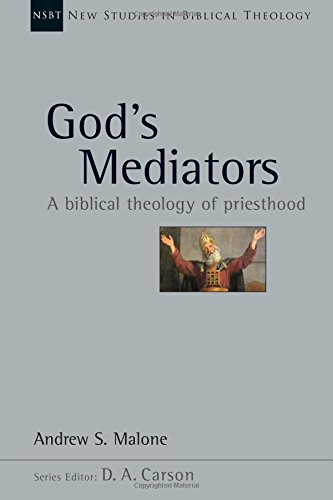A Brief Book Summary from Books at a Glance
By Mark Baker
About the Author
Andrew S. Malone is Lecturer in Biblical Studies at Ridley College, Melbourne, Australia. He is author of Knowing Jesus in the Old Testament? and other essays and articles.
Overview
This book seeks to develop a biblical theology of priesthood. It covers the individual or vocational priesthood separately from corporate priesthood. Additionally, since it is a biblical theology, it traces both of these aspects of priesthood from their OT origins to their NT consummation, giving special attention to the expansion of the theme throughout time. These four aspects or “dimensions” of the priesthood are interrelated, and the task at hand is to determine continuity and discontinuity between various elements of this rich metaphor.
Table of Contents
Orientation
PART 1: GOD’S INDIVIDUAL PRIESTS
The Aaronic Priesthood Begins
Biblical Antecedents to the Aaronic Priesthood
Old Testament Prospects
New-Covenant Transformations
PART 2: GOD’S CORPORATE PRIESTHOODS
Israel as a Kingdom of Priests
The Church’s Priestly Commission
Concluding Reflections
Summary
Chapter 1: Orientation
If the Bible can be likened to a beautiful tapestry containing many colors, then Biblical Theology is the study of the reoccurring or thematic colors in the tapestry. More specifically, Biblical Theology seeks to study individual “strands” or themes in order to detect changes as God’s revelation progressed through time. This point illustrates the difference between Biblical and Systematic Theology: Systematic Theology looks at the tapestry as a whole, whereas Biblical Theology “remains alert to variations that occur as the whole is being produced. These kinds of observations are often described by the terms continuity and discontinuity.
A brief overview of a Biblical Theology of the priesthood reveals two kinds of priests: individual and national. The former was “singled out within a community” (6). For the latter, “God commissioned the whole Israelite people as a corporate, national priesthood” (7). Part 1 of this book will focus on the individual priest and part 2 will cover the “kingdom of priests.”
PART 1: GOD’S INDIVIDUAL PRIESTS
Chapter 2: The Aaronic Priesthood Begins
This chapter looks at the priesthood in the Pentateuch; the primary focus of the priesthood here is “facilitating proximity between God and humanity” (13). Genesis 3 sets the stage for this theme: when Adam and Eve sin, they are exiled out of the garden. Such an exile was actually evidence of God’s mercy because their sin made God’s presence dangerous. What was once a delight became deadly in light of Adam and Eve’s sins. This theme continues to develop throughout the Pentateuch. God is holy and will not abide with the wicked, yet he remains in covenant relationship with his people. This tension is resolved through the priesthood: “Safe approach to God will become an important element of priestly service” (18).
Even the casual reader of Exodus–Numbers will observe the focus on priestly rituals and holiness codes throughout these early books of the Bible. It’s important not to miss the forest for the trees here: all these details—the priestly garments, the sacrifices and offerings—point toward the mediating role of the priesthood. In Exodus, Moses serves as a kind of priest. Amazingly, Moses’ proximity to Yahweh even causes his face to shine (Exod 34:29–35).
The expansion of the priestly office in Leviticus specifies another similar role of priests: “They are to ‘differentiate’… between the holy and the common, the unclean and the clean; and they are to teach the Israelites all the commands given by God through Moses” (37). The book of Numbers adds a new development: not only is God uniquely present in the. . .
[To continue reading this summary, please see below....]The remainder of this article is premium content. Become a member to continue reading.
Already have an account? Sign In
